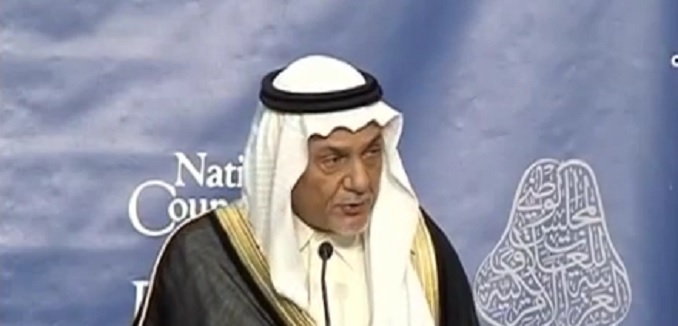The Daily Beast’s Eli Lake and Josh Rogin reported last week that the Obama administration’s diplomacy toward Iran was risking a cascade of new nuclear proliferators across the Middle East, with both Western and Israeli intelligence agencies telling the outlet that Saudi Arabia is developing uranium enrichment infrastructure that has long been ‘considered by arms control experts as a tell-tale sign of a clandestine weapons program.’ Riyadh is said to be concerned that the U.S. has acknowledged that Iran will be allowed to continue enriching uranium under the terms of a comprehensive deal, a capability that the Saudis insist will allow the Tehran to break out at will. Saudi officials have consistently maintained that they will match any Iranian nuclear capability with their own, and the Daily Beast tersely described the situation as one in which the administration’s Iran stance was “pushing Saudi Arabia toward its own nuke program.”
If Saudi Arabia pursue nuclear enrichment even if there is an Iran deal, then the victory to curb atomic weapons that Obama has tried to achieve will be at least partially undone by his own diplomacy. “They view the developments in Iran very negatively. They have money, they can buy talent, they can buy training,” said David Albright, the president of the Institute for Science and International Security and a former weapons inspector. “The Saudis are thinking through how do you create a deterrent through capability.”
This prospect of the Saudis beginning an enrichment program was broached earlier this month at the Munich Security Conference. Sen. Lindsey Graham asked Saudi Prince Turki al Faisal, the kingdom’s powerful former intelligence chief, if any final agreement that allowed Iran to maintain an enrichment capability would cause Saudi Arabia and other Arab states to invoke their own right to enrich uranium. “I think we should insist on having equal rights for everybody, this is part of the (Non-Proliferation Treaty) arrangement,” the prince said.
Last October Prince Turki al-Faisal, a former ambassador to Washington, suggested that “Gulf Cooperation Council members should carefully weigh all options, including acquiring a nuclear deterrent,” if Iran acquires nuclear weapons. Last November the BBC reported that the Saudis were looking to bolster their nuclear deterrent, potentially by purchasing nuclear weapons off the shelf from Pakistan. Last December TIME published a similar report, describing “an almost palpable sense of frustration, betrayal and impotence” in Saudi Arabia. President Barack Obama himself, during a period when the administration was still insisting that its goal was to force Iran to fully suspend its nuclear program, acknowledged that Iranian nuclear weapons acquisition “could trigger an arms race in the region… [and] would undermine our non-proliferation goals.” The Daily Beast report comes a day after Greg Jones, speaking on a conference call hosted by The Israel Project, assessed that permitting Iran to continue enriching uranium under a comprehensive agreement – after Tehran had “violated its IAEA safeguards [and] defied multiple UN Security Council resolutions to stop centrifuge enrichment” – risked a global domino effect. A transcript of the call with Jones is here and the audio is available for streaming here.




